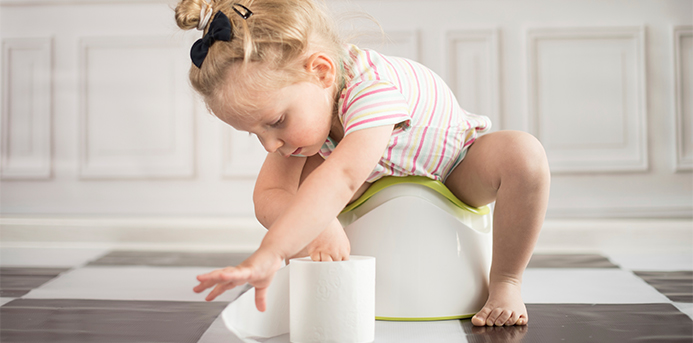Few phrases inspire more fear in parents than the dreaded “potty training.” But, getting your child to ditch diapers for big-kid pants doesn’t have to be painful.
Jamie Glowacki, author of “Oh Crap! Potty Training: Everything Modern Parents Need to Know to Do It Once and Do It Right” (Touchstone, 2015), has counseled hundreds of parents through toilet training both in person and also online. Calling herself the “Pied Piper of Poop,” Glowacki believes that parental anxiety around the topic stems primarily from social media.
“Now we have the ability to spread widely a horror story,” she says.
Add to that the many competing approaches, from the aggressive-sounding boot camp method to the laissez-faire child-led approach. “Today’s parent is really paralyzed with choice,” she says.
In addition, daycare and preschool programs that mandate that kids be out of diapers by a certain age ramp up the pressure on parents.
To make the process go smoothly, Glowacki advocates this approach: Take away the diapers and keep your child home and close to the potty for as long as possible. Stay calm and committed to the process. Don’t bribe, reward or threaten. (“I’ve had kids learn to meter out one pee for 15 M&Ms,” she says.) Within three to seven days most kids will be able to stay dry most of the time.
It helps to (ahem) go with the flow, Glowacki adds. Ninety-nine percent of the time a child refuses to go “because the parents are hovering and putting way too much pressure on the child.” She suggests that parents make the act a choice or a challenge, rather than a chore, by betting the child he or she can’t go by the time they count to 10, say, or by asking if the child wants to use the big potty or little potty.
Mark L. Wolraich, MD, is a professor of pediatrics at Oklahoma University Health Sciences Center and editor of the American Academy of Pediatrics Guide to Toilet Training. He agrees that a parent’s demeanor can make or break potty training. “It’s helpful for parents to think of themselves as enablers,” he says. “It’s a developmental process that’s going to occur. The parents’ role is to help their child when they’re ready for that process.”
And if it’s not going well? Take a step back, Wolraich advises. “We usually encourage if the child is showing resistance to it, then better to back off and wait a while longer,” he says. “The age that they become potty trained is not a reflection on their intelligence or development.”
One misconception Glowacki hopes to end is that children will tell you when they’re ready to potty train. “I haven’t met the child yet who says, ‘Okay, I’m ready,’” she says. Instead, she recommends taking away the diapers and pull-ups (for daytime) between 20 and 30 months. “At this stage they love helping and being useful,” she says. “And they want to do everything themselves.”
Glowacki also dispels the myth that boys are harder to train than girls. In her experience, boys master the art of staying dry just as quickly. Plus, they have the added benefit of being able to pee anywhere—within reason, of course.
Ashley Hickey, potty training consultant and owner of Successful Potty Training, LLC, tells parents that consistency is key.
“If you start and stop repeatedly, it will only delay the process,” she says. “It’s important to make sure the child is ready, but even more important that you are ready. So make sure you have the time and patience to stick with it once you begin.”
Sorry, parents, accidents will happen. Times of upheaval in the family, such as the birth of a new sibling, can cause potty training regressions as well, Wolraich says. But with these expert tips, going diaper-free doesn’t have to be as messy as you expect.
More from Make It Better
- Hiring a Nanny? You Need to Read This!
- 7 Books That Will Inspire Your Superhero in Training
- Should Kids Be Invited to Weddings?

